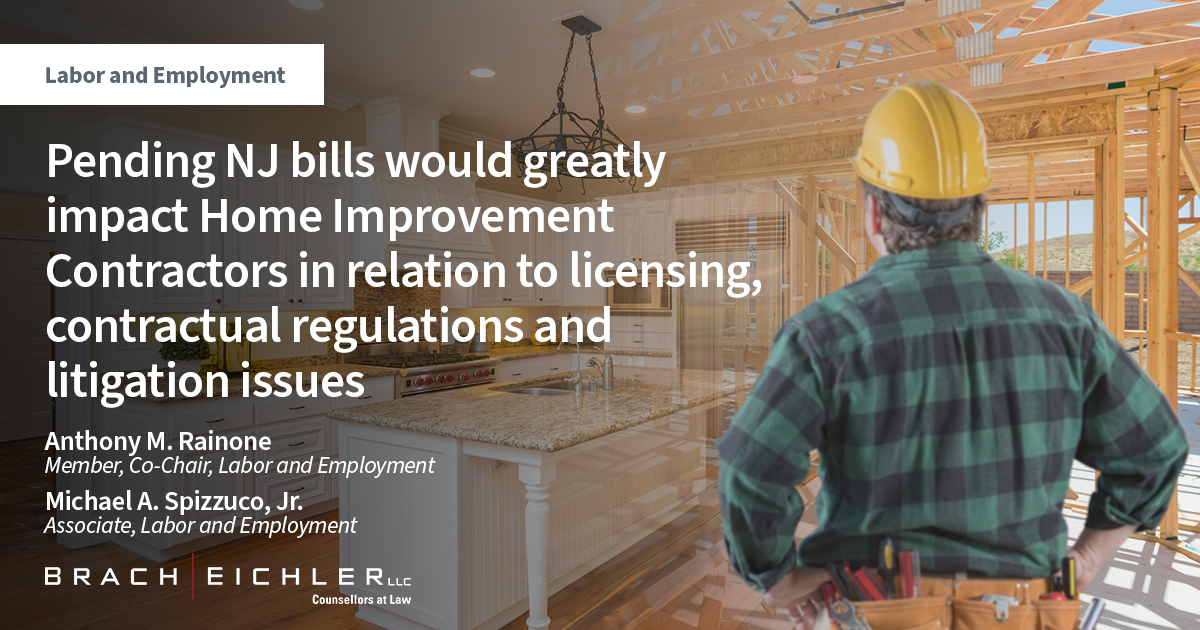Pending NJ bills would greatly impact Home Improvement Contractors in relation to licensing, contractual regulations and litigation issues

9/26/2022
A pair of companion bills currently pending in the New Jersey State legislature, if signed into law, would greatly impact home improvement contractors (“HIC”) in relation to licensing, contractual regulations and litigation issues. The proposed law would create inconsistency between the current New Jersey Consumer Fraud Act (the “CFA”) and the Affidavit of Merit Statute (the “AOM Statute”).
PROPOSED NEW LICENSING REQUIREMENTS
The new law would create the New Jersey Board of Home Improvement and Elevation Contractors, which will be appointed to oversee HIC’s. In order to be licensed, a HIC would be required to either: (a) complete an apprenticeship program registered with the Department of Labor, or similar program through a trade school, or (2) possess at least two years’ experience under the direct supervision of a licensed HIC. Proposed HIC’s would also have to pass an exam relating to “general contracting,” as well as provide proof of financial stability. Most significantly, HIC’s would be required to post a bond, irrevocable letter of credit, or other security acceptable by the board, in a minimum amount of $100,000.00.
PROPOSED NEW FORM CONTRACT REQUIREMENTS
Additional disclosures and warnings to consumers would also be required from the HIC. For example, HICs would be required to provide a separate receipt after the execution of a home improvement contract with new required disclosures. If an HIC advertises or regularly uses a language other than English, then the HIC would be required to provide any document, including the home improvement contract, in English and another copy in the other language used.
PROPOSED NEW REQUIREMENTS FOR CANCELLATION OF CONTRACTS
After receiving an appropriate cancellation notice from a customer, HIC’s would be required to remove any unused goods/materials from the job site and refund all money to the customer within ten days. The current law requires these acts within thirty days. Additionally, HIC’s would be required to maintain the cancellation notice from a customer for at least 18 months.
CFA IMPLICATIONS
The “learned professional exemption” of the CFA generally provides a shield from liability for those professions where there are uniform regulations of an occupation. Daaleman v. Elizabethtown Gas Co., 77 N.J. 267, 272 (1978). Of course, HIC’s are one of the most heavily regulated professions in NJ and currently, violations of the regulations covering HIC’s result in per se CFA violations. But contractors generally are not considered learned professionals. If this new board is created, it is unclear whether contractors who are currently subject to the CFA would be able to claim the learned professional exemption to the CFA’s coverage. The proposed law does not answer this question.
AOM STATUTE IMPLICATIONS
Many of the professions covered by the “learned professional exemption” overlap with the professions governed by the AOM Statute (such as licensed engineers and architects). In a civil lawsuit against a professional, the AOM statute requires a claimant to file and serve an affidavit from an independent professional concluding that the allegations of the claimant show that the professional’s conduct fell below the applicable standard of care. But claimants against HICs generally do not need to serve an affidavit of merit to maintain a negligence claim against a HIC. But now that HIC’s may be subject to licensure requirements, the question remains as to whether the AOM Statute will be amended to specifically include HIC’s.
The proposed law, if passed in its current form, will greatly affect how HICs operate in the future by requiring additional regulatory requirements and financial costs on HICs. In addition, it will create ambiguity leading to litigation as to the CFAs learned professional exception.
Related Practices: Labor and Employment, Litigation
Related Attorney: Anthony M. Rainone, Michael A. Spizzuco, Jr.












